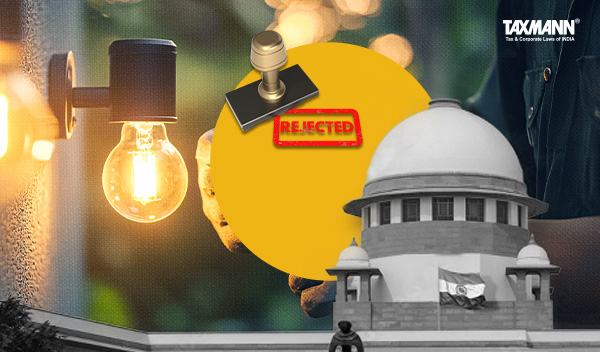HC Quashes Pre-Insolvency Dues Claim | Orders Power-Co. to Provide New Electricity Connection for Petitioner
- Blog|News|Insolvency and Bankruptcy Code|
- 2 Min Read
- By Taxmann
- |
- Last Updated on 25 September, 2024

Case Details: Reliance Infratel Ltd. v. State of Meghalaya - [2024] 166 taxmann.com 522 (HC-Meghalaya)
Judiciary and Counsel Details
- H.S. Thangkhiew, J.
- V.V.V. Sastry & H. Abraham, Advs. for the Petitioner.
- A. Kumar, AG & Ms R. Colney, GA for the Respondent.
Facts of the Case
In the instant case, the petitioner company was admitted into insolvency, and a resolution plan was approved for the takeover of the petitioner company. Pursuant to the said resolution plan, the petitioner company was taken over.
Later, respondent No. 2- Meghalaya Power Distribution Corporation Ltd. (MPDCL) had sought recovery of electricity dues from the petitioner for periods before takeover and, also from affiliates of the petitioner by threatening to disconnect existing electricity connections for mobile towers, and further refused to provide new electricity connections to the petitioner and its affiliates.
Aggrieved thereby, the petitioner, by way of an instant writ petition had challenged the impugned letter issued by respondent No. 2. It was noted that RP had addressed a letter to all State Electricity Boards informing them of CIRP and further, had invited any claims which had not yet been submitted against corporate debtor however respondent No. 2 had appeared but did not submit any claims in respect of their dues as was done by other creditors.
High Court Held
The High Court observed that since respondent No. 2 did not participate in the resolution process and as such, as per section 31 of the IBC was bound by the same, dues claimed by respondent No. 2 for periods before effective date, i.e. 22-12-2022, on approval of resolution plan, on no claim being made by respondent No. 2, would stand extinguished.
The High Court held that Section 56 of the Electricity Act, 2003 would not be attracted, as it was not a case where the petitioner, after the effective date, had neglected to pay any charge of electricity, or that any amount was due. Thus, the stand of respondent No. 2 that the petitioner was liable to pay in terms of section 56 of the Electricity Act was unsustainable.
The High Court, further held that despite the binding nature of section 31, respondent No. 2 was denying the petitioner electricity connections by making the same contingent upon recovery of pending dues not attributable to it. Thus, the instant writ petition was to be allowed.
List of Cases Reviewed
- Ghanshyam Mishra v. Edelweiss Asset Reconstruction Co. Ltd. (2021) 9 SCC 657 (para 16) followed.
- State Tax Officer v. Rainbow Papers Ltd. (2022) SCC OnLine SC 1162 (para 18) distinguished.
List of Cases Referred to
- Ghanshyam Mishra v. Edelweiss Asset Reconstruction Co. Ltd. (2021) 9 SCC 657 (para 5)
- Ruchi Soya Industries v. Union of India (2022) 6 SCC 343 (para 5)
- Paschimanchal Vidyut Vitran Nigam Limited v. Raman Ispat Pvt. Ltd (para 5)
- Tata Power Western Odisha Distribution Limited (TPWODL) & Anr. v. Jagannath Sponge Private Limited (para 5)
- Telangana State Southern Power Distribution Company Ltd. & Anr. v. Srigdhaa Beverages (2020) 6 SCC 404 (para 9)
- Sanjay Kumar Jha v. Prakash Chandra Chaudhary (2019) 2 SCC 499 (para 11)
- World Tel Inc. v. Union of India (2001) 10 SCC 513 (para 11).
Disclaimer: The content/information published on the website is only for general information of the user and shall not be construed as legal advice. While the Taxmann has exercised reasonable efforts to ensure the veracity of information/content published, Taxmann shall be under no liability in any manner whatsoever for incorrect information, if any.

Taxmann Publications has a dedicated in-house Research & Editorial Team. This team consists of a team of Chartered Accountants, Company Secretaries, and Lawyers. This team works under the guidance and supervision of editor-in-chief Mr Rakesh Bhargava.
The Research and Editorial Team is responsible for developing reliable and accurate content for the readers. The team follows the six-sigma approach to achieve the benchmark of zero error in its publications and research platforms. The team ensures that the following publication guidelines are thoroughly followed while developing the content:
- The statutory material is obtained only from the authorized and reliable sources
- All the latest developments in the judicial and legislative fields are covered
- Prepare the analytical write-ups on current, controversial, and important issues to help the readers to understand the concept and its implications
- Every content published by Taxmann is complete, accurate and lucid
- All evidence-based statements are supported with proper reference to Section, Circular No., Notification No. or citations
- The golden rules of grammar, style and consistency are thoroughly followed
- Font and size that’s easy to read and remain consistent across all imprint and digital publications are applied



 CA | CS | CMA
CA | CS | CMA
